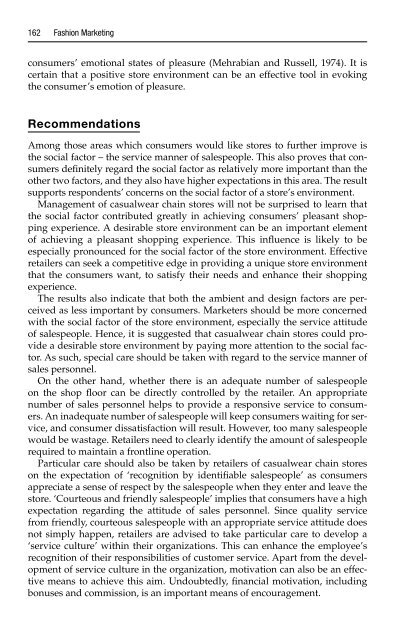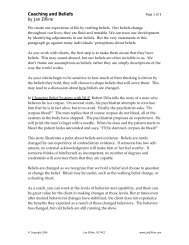- Page 2 and 3:
Fashion Marketing
- Page 4 and 5:
Fashion Marketing Contemporary Issu
- Page 6 and 7:
Contents Foreword List of Contribut
- Page 8 and 9:
Contents vii Why do fashion retaile
- Page 10 and 11:
Contents ix 14 The international fl
- Page 12 and 13:
Foreword Fashion is driven by creat
- Page 14 and 15:
List of contributors Emma Banister
- Page 16 and 17:
List of Contributors xv identity. H
- Page 18 and 19:
List of Contributors xvii M. C. Lam
- Page 20 and 21:
Acknowledgements Tony would like to
- Page 22 and 23:
Introduction In this introduction t
- Page 24 and 25:
Introduction xxiii supermarket fash
- Page 26 and 27:
1 Globalization: global markets and
- Page 28 and 29:
Globalization: global markets and g
- Page 30 and 31:
Globalization: global markets and g
- Page 32 and 33:
Globalization: global markets and g
- Page 34 and 35:
Globalization: global markets and g
- Page 36 and 37:
Globalization: global markets and g
- Page 38 and 39:
Globalization: global markets and g
- Page 40 and 41:
Globalization: global markets and g
- Page 42 and 43:
Globalization: global markets and g
- Page 44 and 45:
Globalization: global markets and g
- Page 46 and 47:
Globalization: global markets and g
- Page 48 and 49:
Globalization: global markets and g
- Page 50 and 51:
Globalization: global markets and g
- Page 52 and 53:
2 Supply chain strategies, structur
- Page 54 and 55:
Supply chain strategies, structures
- Page 56 and 57:
Supply chain strategies, structures
- Page 58 and 59:
Supply chain strategies, structures
- Page 60 and 61:
Supply chain strategies, structures
- Page 62 and 63:
Supply chain strategies, structures
- Page 64 and 65:
Supply chain strategies, structures
- Page 66 and 67:
Supply chain strategies, structures
- Page 68 and 69:
Supply chain strategies, structures
- Page 70 and 71:
Supply chain strategies, structures
- Page 72 and 73:
Supply chain strategies, structures
- Page 74 and 75:
Supply chain strategies, structures
- Page 76 and 77:
Supply chain strategies, structures
- Page 78 and 79:
Supply chain strategies, structures
- Page 80 and 81:
Challenges of fashion buying and me
- Page 82 and 83:
Challenges of fashion buying and me
- Page 84 and 85:
Challenges of fashion buying and me
- Page 86 and 87:
Challenges of fashion buying and me
- Page 88 and 89:
Challenges of fashion buying and me
- Page 90 and 91:
Challenges of fashion buying and me
- Page 92 and 93:
Challenges of fashion buying and me
- Page 94 and 95:
Challenges of fashion buying and me
- Page 96 and 97:
Challenges of fashion buying and me
- Page 98 and 99:
4 Segmenting fashion consumers: rec
- Page 100 and 101:
Segmenting fashion consumers 75 req
- Page 102 and 103:
Segmenting fashion consumers 77 seg
- Page 104 and 105:
Segmenting fashion consumers 79 (19
- Page 106 and 107:
Segmenting fashion consumers 81 (20
- Page 108 and 109:
Segmenting fashion consumers 83 if
- Page 110 and 111:
Segmenting fashion consumers 85 of
- Page 112 and 113:
Segmenting fashion consumers 87 Gub
- Page 114 and 115:
5 Developing a research agenda for
- Page 116 and 117:
Developing a research agenda for th
- Page 118 and 119:
Developing a research agenda for th
- Page 120 and 121:
Developing a research agenda for th
- Page 122 and 123:
Developing a research agenda for th
- Page 124 and 125:
Developing a research agenda for th
- Page 126 and 127:
Developing a research agenda for th
- Page 128 and 129:
Developing a research agenda for th
- Page 130 and 131:
Developing a research agenda for th
- Page 132 and 133:
6 Retail brand marketing in the fas
- Page 134 and 135:
Retail brand marketing in the fashi
- Page 136 and 137: Retail brand marketing in the fashi
- Page 138 and 139: Retail brand marketing in the fashi
- Page 140 and 141: Retail brand marketing in the fashi
- Page 142 and 143: Retail brand marketing in the fashi
- Page 144 and 145: Retail brand marketing in the fashi
- Page 146 and 147: Retail brand marketing in the fashi
- Page 148 and 149: Retail brand marketing in the fashi
- Page 150 and 151: Retail brand marketing in the fashi
- Page 152 and 153: Retail brand marketing in the fashi
- Page 154 and 155: Retail brand marketing in the fashi
- Page 156 and 157: Competitive marketing strategies of
- Page 158 and 159: Competitive marketing strategies of
- Page 160 and 161: Competitive marketing strategies of
- Page 162 and 163: Competitive marketing strategies of
- Page 164 and 165: Competitive marketing strategies of
- Page 166 and 167: Competitive marketing strategies of
- Page 168 and 169: Competitive marketing strategies of
- Page 170 and 171: Competitive marketing strategies of
- Page 172 and 173: Competitive marketing strategies of
- Page 174 and 175: Competitive marketing strategies of
- Page 176 and 177: 8 Store environment of fashion reta
- Page 178 and 179: Store environment of fashion retail
- Page 180 and 181: Store environment of fashion retail
- Page 182 and 183: Store environment of fashion retail
- Page 184 and 185: Store environment of fashion retail
- Page 188 and 189: Store environment of fashion retail
- Page 190 and 191: Store environment of fashion retail
- Page 192 and 193: Store environment of fashion retail
- Page 194 and 195: The process of trend development le
- Page 196 and 197: The process of trend development le
- Page 198 and 199: The process of trend development le
- Page 200 and 201: The process of trend development le
- Page 202 and 203: The process of trend development le
- Page 204 and 205: The process of trend development le
- Page 206 and 207: The process of trend development le
- Page 208 and 209: The process of trend development le
- Page 210 and 211: The process of trend development le
- Page 212 and 213: The process of trend development le
- Page 214 and 215: Innovation management in creating n
- Page 216 and 217: Innovation management in creating n
- Page 218 and 219: Innovation management in creating n
- Page 220 and 221: Marketing plan Phase 1: Line planni
- Page 222 and 223: Innovation management in creating n
- Page 224 and 225: Innovation management in creating n
- Page 226 and 227: Innovation management in creating n
- Page 228 and 229: Innovation management in creating n
- Page 230 and 231: Innovation management in creating n
- Page 232 and 233: Innovation management in creating n
- Page 234 and 235: Innovation management in creating n
- Page 236 and 237:
Innovation management in creating n
- Page 238 and 239:
Innovation management in creating n
- Page 240 and 241:
Innovation management in creating n
- Page 242 and 243:
11 Consumers and their negative sel
- Page 244 and 245:
Consumers and their negative selves
- Page 246 and 247:
Consumers and their negative selves
- Page 248 and 249:
Consumers and their negative selves
- Page 250 and 251:
Consumers and their negative selves
- Page 252 and 253:
Consumers and their negative selves
- Page 254 and 255:
Consumers and their negative selves
- Page 256 and 257:
Fashion retailer desired and percei
- Page 258 and 259:
Fashion retailer desired and percei
- Page 260 and 261:
Schmidt (1995) Corporate Identity M
- Page 262 and 263:
Fashion retailer desired and percei
- Page 264 and 265:
Fashion retailer desired and percei
- Page 266 and 267:
Fashion retailer desired and percei
- Page 268 and 269:
Fashion retailer desired and percei
- Page 270 and 271:
Fashion retailer desired and percei
- Page 272 and 273:
Fashion retailer desired and percei
- Page 274 and 275:
Fashion retailer desired and percei
- Page 276 and 277:
Fashion retailer desired and percei
- Page 278 and 279:
Fashion retailer desired and percei
- Page 280 and 281:
Fashion retailer desired and percei
- Page 282 and 283:
Fashion retailer desired and percei
- Page 284 and 285:
13 Fashion e-tailing Ruth Marciniak
- Page 286 and 287:
Fashion e-tailing 261 retailers are
- Page 288 and 289:
Fashion e-tailing 263 Then and Delo
- Page 290 and 291:
Fashion e-tailing 265 STAGE ONE Dev
- Page 292 and 293:
Fashion e-tailing 267 and Vijaysara
- Page 294 and 295:
Fashion e-tailing 269 Table 13.2 Be
- Page 296 and 297:
Table 13.3 Empirical work on fashio
- Page 298 and 299:
Lu and Rucker Identification of pre
- Page 300 and 301:
Fashion e-tailing 275 Hall, J. (199
- Page 302 and 303:
14 The international flagship store
- Page 304 and 305:
The international flagship stores o
- Page 306 and 307:
The international flagship stores o
- Page 308 and 309:
The international flagship stores o
- Page 310 and 311:
The international flagship stores o
- Page 312 and 313:
The international flagship stores o
- Page 314 and 315:
The international flagship stores o
- Page 316 and 317:
The international flagship stores o
- Page 318 and 319:
The international flagship stores o
- Page 320 and 321:
The international flagship stores o
- Page 322 and 323:
15 The making and marketing of a tr
- Page 324 and 325:
The making and marketing of a trend
- Page 326 and 327:
The making and marketing of a trend
- Page 328 and 329:
The making and marketing of a trend
- Page 330 and 331:
The making and marketing of a trend
- Page 332 and 333:
The making and marketing of a trend
- Page 334 and 335:
Approaches to doing research 309 Cr
- Page 336 and 337:
Approaches to doing research 311 In
- Page 338 and 339:
Approaches to doing research 313 ch
- Page 340 and 341:
Index Accessible luxury, 178 Adidas
- Page 342 and 343:
Index 317 Couture shows, 183 Creati
- Page 344 and 345:
Index 319 free trade, 9-10 impact,
- Page 346 and 347:
Index 321 Micro-marketing, 198 Midd
- Page 348 and 349:
Index 323 design factor, 156-7 soci
















